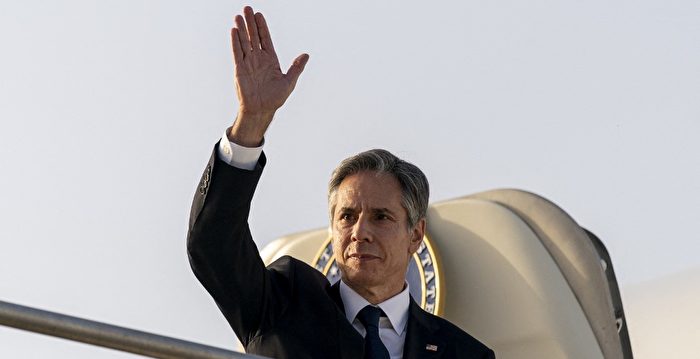[Epoch Times, July 24, 2021](Epoch Times reporter Xia Yu comprehensive report) The US State Department said on Friday (July 23) that US Secretary of State Antony Blinken will travel to India next week. This is the first time the top diplomat of the Biden administration has visited the world‘s largest democracy and an important ally of the United States in Asia. This trip to Brinken will focus on two major issues, vaccines and China.
Brinken will also visit Kuwait and meet with senior officials after his visit to India from July 26 to 29.
The United States sees India as an important partner in countering the increasingly tough behavior of the Chinese Communist Party. Brinken’s trip will be after Deputy Secretary of State Wendy Sherman (Wendy Sherman) visits China, and also coincides with Secretary of Defense Lloyd Austin (Lloyd Austin)’s visit to Southeast Asia.
Next Wednesday, Brinken will meet Indian Prime Minister Narendra Modi and Foreign Minister Subrahmanyam Jaishankar in New Delhi.
A statement from the US State Department stated that the agenda of Brinken’s visit to India will include “Indo-Pacific participation, common regional security interests, common democratic values, and response to the climate crisis”, as well as responding to the coronavirus (CCP virus) pandemic.
Or discuss the face-to-face summit of the Sifang Group to confront the CCP as the theme
Brinken may discuss the face-to-face summit plan of the Group of Four (India, Japan, Australia, and the United States), which is seen as a measure to counter the growing influence of the CCP. In the face of the CCP’s large-scale “Belt and Road” initiative, it is expected that the Quad talks (Quad) later this year will focus on how to develop regional infrastructure.
US Secretary of Defense Lloyd Austin visited ASEAN (ASEAN, Association of Southeast Asian Nations, also known as ASEAN) countries such as Singapore, Vietnam, and the Philippines on Friday (July 23). A Pentagon spokesperson said that the visit will show the Biden administration’s importance to Southeast Asia and ASEAN countries and emphasize its security commitments to the region.
Zheng Qinmo, director of the Department of Diplomacy and International Relations at Tamkang University in Taiwan, analyzed in an interview with Epoch Times that the US move is intended to complete the containment of China (the CCP) in the Indo-Pacific region and offset the CCP’s reclamation and construction of islands in the South China Sea. The threat of militarization.
In November last year, India, the United States, Japan, and Australia conducted the largest joint naval exercise in more than a decade as part of an effort to balance the CCP’s growing military and economic power in the region.
Brinken supports India’s vaccines against China’s vaccine diplomacy
The U.S. hosted the four-nation online summit in March. At the meeting, the four countries agreed that Indian drug maker Biological E Ltd would produce at least 1 billion doses of coronavirus vaccine by the end of 2022, mainly for use in Southeast Asia and Pacific countries.
However, after a large-scale epidemic broke out in India, the United States sent raw materials for vaccines, medical equipment and protective equipment to India.
India is expected to receive 3 to 4 million doses of US-made vaccines by August.
“(India) is a key country in the fight against COVID-19.” Brinken told MSNBC on Friday, explaining that India will eventually become an important source of vaccines for the world.
“Of course, it is understandable that they are now focusing on their own internal challenges, but when the production engine is fully operational and can be redistributed to other parts of the world, it will make a big difference.”
The CCP has been implementing vaccine diplomacy in Southeast Asian countries in an attempt to lead Europe and the United States in filling the vaccine vacancies in Southeast Asian countries. However, this advantage has not been transformed into the CCP’s “soft power”, and the CCP’s vaccine diplomacy has not won the strategic trust of Southeast Asian countries.
Khairulanwar Zaini, a researcher at the Regional Strategy and Politics Project of the Yusof Issa Southeast Asia Institute in Singapore, said in an e-mail to the Voice of America that Indonesia and other Southeast Asian countries are safe for Chinese vaccines. Worries have always existed.
Zani emphasized that although the CCP has won some goodwill among Southeast Asian countries through vaccine diplomacy, it has not yet won their strategic trust. Southeast Asian countries’ efforts to diversify vaccine supply and avoid relying entirely on the CCP are a good example.
Editor in charge: Li Huanyu#
.
